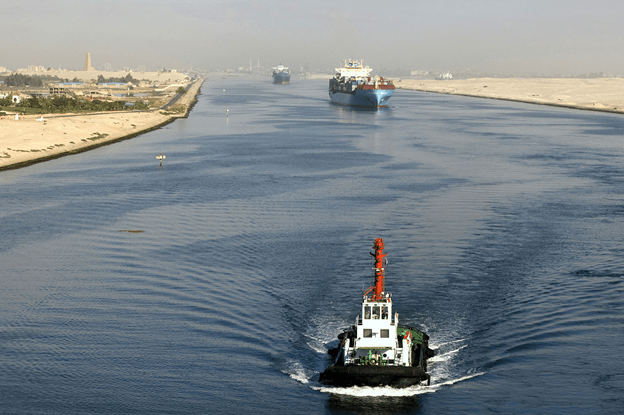- Home
Blog Blog
Export & Import Export & Import
Got Your Shipment Delayed and Already Processed the Payment? Suez Canal Blockage Might Be The Reason!
Got Your Shipment Delayed and Already Processed the Payment? Suez Canal Blockage Might Be The Reason!

What is the Suez Canal?
The Suez Canal is a 193 KM artificial man-made canal – making it the world’s longest canal with no blocks. It is a very busy trade route & has been the shortest sea link between Asia and Europe since 1869.

Importance of Suez Canal
With the responsibility of 30% container-ship traffic daily, these waterways saw 18,800 vessels pass in 2020.
Being one of the most heavily used shipping lanes for global trade, the Suez Canal was responsible for 12% of the global trade by volume. It was popular for its delivery in the energy markets but also transported multiple other agricultural commodities like coffee.
It transfers 7% of the world’s oil, making it the busiest waterways in the world known to be used by oil tankers for shipping crude oil from the Middle East to Europe and North America.
What was the blockage?
MV ‘Ever Given’, a container ship that is 400m-long (1,312ft) and weighed around 200,000 tonnes got diagonally stuck in the Suez Canal waterway on March 23, 2021, when it was on its way to the Netherlands from China.
It blocked the 193 km waterway, preventing the other vessels from passing. This ship has a maximum capacity of 20,000 containers but was at the point carrying only 18,300 containers. It was finally freed about a week later allowing Suez Canal to continue playing its role as the world’s most critical man-made waterways.
Cost of the blockage
The Suez Canal blockage incident has brought to the forefront how connected global trade is.
This blockage of the Suez Canal led to huge disruption in the global trade and supply chain, bringing it to a standstill. According to freight companies that had containers on the ever-given – it wasn’t just the crude oil supply & global oil supply chain that was being adversely impacted but everything from coconut milk to coffee to motor spare parts and Amazon goods were stuck. They were worried and companies were concerned that if the canal didn’t get unblocked, they may be required to reorder the goods and deliver by air freight, costing three times the price.
This blockage didn’t just affect the global shipping industry or the Egyptian economy but countless businesses including retailers, supermarkets, domestic transport providers, and manufacturers suffered as a result.
If you are looking for numbers to fathom the gravity of the situation:
- • $9.6 billion worth of goods was held up daily by the stranded ship
- • This is the same $400m and 3.3 million tonnes of cargo an hour, costing about $6.7m a minute
- • Cost trade $6-$10 billion weekly
- • Price rise of daily-use goods such as toilet paper, coffee, and laptops
Unforeseen incidents like this lead to the longer shipping time, reduced or no stock availability, money tied up on goods at sea rather than in the buyer’s warehouses, thereby leading to more stress. Not only is the impact faced by the exporters and importers but by the end customer, retailers, and shopkeepers. Alternative shipping routes are longer, air freight is higher – there is a ripple effect when the ships reach the port late, there is pressure on ports to offload them quickly and then pressure on transporters to transport them. Concerning monetary losses international bank transfers might have been made but goods haven’t been reached. The entire value chain globally gets adversely impacted.
To be equipped to deal with and handle all this, there is a dire need to partner with a trusted and reliable escrow service provider such as Omoney to help protect your overseas trade and international b2b payment. Omoney escrow services eliminate the risk for both the seller and the buyer by enabling a smooth and protected international b2b payment for exporters and importers, once the obligations have been met.
Category

Export & Import
Got Your Shipment Delayed and Already Processed the Payment? Suez Canal Blockage Might Be The Reason!
Related Articles

Why Do B2B Businesses Need Escrow Services

Problems Escrow Is Intended to Solve






